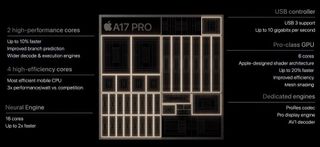Apple's iPhone and Mac chip deal with Arm might be the bargain of the century
It's a bargain.

Devices like the iPhone 15 and MacBook Air use Apple-designed chips, built by TSMC, and they're fast. Very fast, especially for mobile chips that are designed to be performant while still sipping at battery power in ways that competing chips from companies like AMD, Qualcomm, and Intel have historically been unable to manage. The transition of the Mac away from Intel chips and towards Apple's own chips has been a resounding success. But none of that would have been possible without Arm, a British company bought by SoftBank for a cool $32 billion back in 2016.
Arm is a company that quietly helps power some of the most-used devices on the planet, and it could have an important part to play in the devices that we all use moving into a new world of autonomous vehicles and other futuristic technology. It does that by designing chips and then licensing those designs out to other companies. Other licenses are for the core technology so companies can then build on that with their own ideas, much like Apple and its deal. And it's that deal that is under the spotlight right now after a new report shared previously unknown details about a deal that is incredibly good value for the iPhone maker — and terrible for Arm.
That deal sees Apple hand over less than 30 cents from every device it sells, a figure that will be a surprise to everyone — including those working for both companies. The report details how Apple's secretive nature means that the figure was previously only known by a small number of people, with sales of hundreds of millions of iPhones, Macs, iPads, and even Apple Watches raking in such a small amount of revenue from Apple that SoftBank has tried, and failed, to get the terms of the deal changed. It's easy to see why Apple might not want to do it.
5% of Arm's sales come from Apple

The report comes via The Information's Wayne Ma and Corey Weinberg and begins with SoftBank CEO Masayoshi San being incredulous about the 30-cent figure back in 2017, shortly after his company bought Arm. He probably wasn't the only one wondering why that figure was allowed to happen.
Six years later, The Information reports, things haven't gotten any better.
That 30-cent royalty rate is "the lowest royalty rate among Arm’s smartphone chip customers, traditionally its biggest group of customers by revenue," sources reportedly said. "As a result, Apple accounts for less than 5% of Arm’s sales, around half the figure for each of the chip company’s top two customers, Qualcomm and Mediatek, they said."
Amazingly, the report notes that Arm posted only $524 million in net income for the fiscal year that ended in March 2023, a figure that pales beside Apple's — in fact, it's just 1% of Apple's annual profit.
Predictably, Apple didn't want anyone to find out about its sweet deal, forcing Arm employees to refer to the company by a codename — Fender — to ensure that the deal was kept private.
No sign of a change
As you might expect, Apple is quite happy with its deal and despite Softbank's protestations. On one occasion Arm tried to change the deal only for Apple CEO Tim Cook to shut the discussions down, pointing to a contract that doesn't expire until 2028. Since then discussions have been in place, but it's unclear whether that 30-cent fee is going to increase significantly once the current deal comes to an end.
Notably, Apple is said to already be working on a plan that could see its need for Arm technology diminish, a move that could further squeeze Arm's income. It isn't just the money, either. Arm reportedly uses Apple as a poster child for its success, pointing to its chips when trying to win new business. The loss of Apple could be a bigger problem for Arm than the loss of Arm would be for Apple if and when a parting of the ways does happen.
More from iMore
Master your iPhone in minutes
iMore offers spot-on advice and guidance from our team of experts, with decades of Apple device experience to lean on. Learn more with iMore!

Oliver Haslam has written about Apple and the wider technology business for more than a decade with bylines on How-To Geek, PC Mag, iDownloadBlog, and many more. He has also been published in print for Macworld, including cover stories. At iMore, Oliver is involved in daily news coverage and, not being short of opinions, has been known to 'explain' those thoughts in more detail, too.
Having grown up using PCs and spending far too much money on graphics card and flashy RAM, Oliver switched to the Mac with a G5 iMac and hasn't looked back. Since then he's seen the growth of the smartphone world, backed by iPhone, and new product categories come and go. Current expertise includes iOS, macOS, streaming services, and pretty much anything that has a battery or plugs into a wall. Oliver also covers mobile gaming for iMore, with Apple Arcade a particular focus. He's been gaming since the Atari 2600 days and still struggles to comprehend the fact he can play console quality titles on his pocket computer.
-
naddy69 "Amazingly, the report notes that Arm posted only $524 million in net income for the fiscal year that ended in March 2023".Reply
Considering Arm does not actually DO anything, $500 million dollars a year is pretty sweet. They just own the patents/copyrights/whatever to the basic architecture. Apple (and other companies) do the work of designing/building actual working chips and systems.
Most Popular
